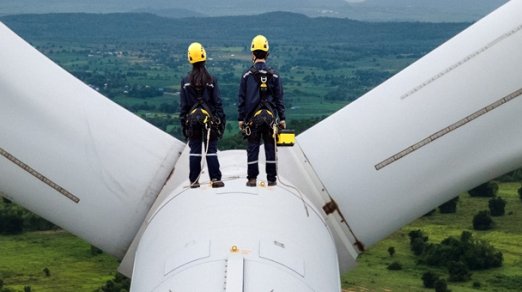Protiviti-Oxford Survey: Executives say emerging technologies will add jobs over the next decade
IN BRIEF
- A staggering 88% of global business executives say AI will be key for a “radical transformation” of their company over the next decade.
- Surprisingly, despite the current environment, 84% of executives believe employee loyalty will increase over the next decade—a number that reaches 95% among North American leaders.
- Globally, 70% of business leaders expect their companies will be embracing a hybrid working model in 2032, up from 22% pre pandemic.
It’s probably not surprising that emerging technology’s role in the future of work, the workforce and workplaces is top of mind for global business leaders; what is surprising is nearly three quarters (74%) of those executives believe digital and emerging technologies will add jobs and increase the size of their workforce over the next decade.
Meanwhile, the vast majority of executives surveyed expect emerging technologies to cause a fundamental shift in the type of work employees will be doing in a decade. Some 86% say the types of jobs employees will perform in the future will be different from today—a figure that remains unchanged based on where a company is headquartered globally.
The Great Resignation and Talent Retention
Business leaders also responded to questions about another dominant trend: talent retention amid what’s been commonly referred to as the “Great Resignation” or the “Great Reshuffle.” Retention and turnover remain a top concern among executives (83%) worldwide. That number jumps to 95% in North America versus 71% of Asia Pacific business leaders. Europe, meanwhile, mirrors the global number.
Surprisingly, despite the current environment, 84% of executives believe employee loyalty will increase over the next decade—a number that reaches 95% among North American leaders.
While they remain optimistic about retaining talent, executives are less so when it comes to finding and securing skilled workers to fill open roles in the future. When queried, 86% expressed concern about a potential shortage of qualified workers over the next 10 years. In North American, that number jumps to a jaw-dropping 97%; among Asia Pacific executives, it dips to 75%. Once again, Europe settles in the middle.
download your copy of the Oxford University & Protiviti survey: Executive Outlook on the Future of Work, 2030 and Beyond.
AI can ease some of the pain of finding talent; 85% of global executives say AI and automated recruitment processes will become more important for hiring over the next decade. That’s not the only traditional HR function that will get a boost from AI, as 76% say they expect the automated delivery of training based on artificial intelligence to improve the skills of their employees in the future.
How, When and Where We’ll Work
Not surprisingly, executives say where and how we’ll work in 2030 and beyond will be vastly different. Pre pandemic, some 78% of global employees worked in a company office location. By 2032, executives expect that number to be down to 30%. In North America, those numbers are 95% and 31%, respectively—down 61 percentage points. Globally, 70% of business leaders expect their companies will be embracing a hybrid working model in 2032, up from 22% pre pandemic.
While the changes in how and where we work will be dramatic, maybe not so much the when. Largely, executives say the standard work week could remain largely unchanged in the future. In what could be seen as a reaction to the pandemic and the current lack of a consistent work week, nearly two-thirds (66%) of leaders think the standard work week—defined as five days and 40 hours in the survey—will be more prevalent a decade from now. That number increases to 78% among North American executives.
Most executives are also keen on the idea of having new employees in a more traditional office setting, citing “efficiency”, “collaboration” and “more effective outcomes” as the biggest advantages to working side-by-side with colleagues.
Meanwhile, perhaps surprisingly, 57% of business leaders say they will mandate how, when and where employees will work in 2032. Considering the flexibility that many employees have had over the last two years, it seems someone is in for a rude awakening.
PROTIVITI-OXFORD SURVEY: EXECUTIVES SAY EMERGING TECHNOLOGIES WILL ADD JOBS OVER THE NEXT DECADE - Video transcript
Joe Kornik: Welcome to the VISION by Protiviti interview. I’m Joe Kornik, Editor-in-Chief of VISION by Protiviti, where we’re looking to the future to examine the big topics that will impact businesses worldwide over the next decade and beyond.
Today, I’m excited to speak with David Howard, an associate professor at the University of Oxford, and codirector of the Global Center on Healthcare and Urbanization at Kellogg College, Oxford. David was one of three members of our Oxford team that helped VISION by Protiviti conduct the survey, analyze the results and coauthor the Executive Outlook on the Future of Work, 2030 and Beyond research report. David, thank you so much for joining me today.
David Howard: Great to be here, Joe. Thanks so much for inviting me. I look forward to talking about the survey. There are some really exciting results and findings coming out.
Kornik: Yes, we’re excited about it too, David. Thanks to you and your team for helping us put it together. This is a pretty good-sized survey of 250 C-level executives worldwide about work a decade from now. What would you say is the big takeaway? What’s the big headline from these results?
Howard: In terms of business leaders from around the world, 86% believe that the type of work that their employees will be doing in 2030 will be different than what it is today. That’s a massive transformation in terms of not only how we manage and lead the workforce but also how the workforce responds to changing climates. The other aspect was that technology clearly is a key, and 80% of business leaders recognize that technology would be transformative in terms of the way their business is operated in 10 years’ time, and about 88% recognize that AI — artificial intelligence — will be a key transformative agent within their business context.
The other aspect of that is that while technology is increasingly important, and rapidly so, we only need to look at last two years in terms of the pandemic and how we are now conversing online together. But one of the key aspects given this transformation of the workplace is that 86% of all business leaders recognize that they might find a shortage in terms of skilled labor to engage in their business in 10 years’ time.
Overall, the results show the importance of new and emerging technologies, but also the importance of having a skilled labor force that can engage with and make these technologies profitable for their businesses.
Kornik: A lot a lot of great takeaways. The survey talked a lot about the things you mentioned — certainly, technology and a skilled workforce, labor shortages, etc. The questions covered all aspects — technology, talent, culture, collaboration, jobs and even offices of the future. When you dig down into those specific areas, you’ve already talked about technology a little bit, but what are some of the thoughts around some of those other key areas the survey covered?
Howard: The survey was undertaken in interesting times, in January and February 2022, and it is at a time when many countries and economies are emerging out of the pandemic. A lot of the research on the future of work was undertaken before the pandemic, and now our lives have changed. Our work regimes, the way we manage people, has changed. And what we asked the business leaders to think about was the work they were doing today, but also how to change in 10 years and beyond.
And their response was that 78% of their company’s employees were working in the office before the COVID-19 pandemic, and they’re envisioning that in 10 years’ time, 70% will likely be working some hybrid format between home or communal workspaces, but not in the office. That hybrid format has been, as we know, a massive transformation. But most business leaders recognize that this will remain, and in 10 years’ time, they will be working with a workforce in which 70% will be hybrid.
Kornik: That’s interesting. It’s a global survey, and there’s a lot of back-and-forth when we talk about the different geographies and how the perceptions are different from business leaders in North America versus Europe or Asia-Pacific. There were some interesting differences among those leaders and those three geos. What stood out to you from a geographic perspective?
Howard: There was a recognition across the board that technology is changing business. That was one of the clear takeaways from the survey. But in terms of regional differences, there are some quite stark, anomalous ones. Seventy-eight percent of businesses in North America thought that quantum computing will have no relevance to their business in 2030. When we look at those respondents in Europe and Asia, over 50% say quantum computing will not only have an impact but will have a significantly transformative impact in terms of their business networks and their business operations. There seems to be a quite a stark regional difference in the recognition of the importance of quantum computing.
Kornik: That’s interesting and surprising.
Howard: Joe, can I also add another stark difference? We probably think that our standard working week, five days a week, 40 hours a week, is going to change — as we’re here now, online, etc. — that somehow, the way we live our daily lives and the way we work through our daily lives will change. But the survey says, again, there’s a regional disparity: In North America, 78% of the business leaders said the standard working week would remain quite prevalent — that we would be thinking about five days a week, 40 hours a week, etc. But when we look at the respondents of the business leaders in the Asia-Pacific region, only 35% of the business leaders see the standard working week as having any relevance in 10 years’ time. There seems to be — I wouldn’t say a flexibility, but a very different outlook in terms of how those business leaders in North America and Asia-Pacific view what they might consider a standard working week.
Kornik: Yeah, very interesting. There are a couple of surprises in there. There are always a couple of findings in the surveys that keep us scratching our heads and seem counterintuitive, and you just highlighted a few of them. Can you share any others? Were there any other moments where you thought, “This doesn’t quite make sense?” Or “Let me flip this around and figure out why we’re seeing this result,” perhaps, and it might feel like we shouldn’t be seeing that result?
Howard: From the outside, we recognized that 86% of business leaders thought that staff retention would be an issue in 10 years’ time. But then we also have the notion that 84% of business leaders believe that their employees will be more loyal — that staff loyalty will be increased in 10 years’ time. So, there’s an interesting dilemma: You could say that if business leaders are talking about their own company, they’re thinking, “My company’s good, and my workers are loyal.” But there seems to be a bit of a quandary there. And that increases if we look at them in terms of the responses from North American business leaders — that 95% express concern about staff retention, but also, 95% believe that the loyalty to their company would increase in 10 years’ time.
So, there’s a dilemma there, and the explanation? I don’t know. In some ways, the positive explanation is that businesses know they’re going to be putting a lot of effort and a lot of money and a lot of time and energy into retraining their staff, making sure their staff are upskilled and able to respond to the technological challenges. And on that basis, they’re saying, “We’re going to put a lot of effort into training our workforce, and therefore, we are expecting them to remain loyal to our company and our brand,” etc.
Kornik: One thing that I thought was pretty interesting, David, was, we talked a lot about AI and all of the technology that will be so integral over the next decade. And typically, a lot of people think that AI could be a job killer, or it could decrease the number of jobs. But there was a finding in the survey that indicated that most companies think their workforces will be larger 10 years down the road, even though AI and technology and emerging technologies would be such a big part of it. Do you see that as a disconnect, or do you think that makes complete sense?
Howard: I think bringing in AI to make your company more efficient will be more productive, so there’s an optimism there that we can use technology to expand. The notion was, as you said, that automation would reduce the number of people working on specific jobs, and that that will be the case. But also, if you look at the trends in terms of upskilling, retraining, getting a workforce with greater capacity, then you could say, yes, if we engage with AI, if we have the skilled workforce, if we’re investing in our employees, then this not only will increase profits and revenue and our company’s success but will also allow us to expand the business per se. So, in terms of the business leaders’ response, there is quite a positive correlation between AI and the growth of their workforce, and the growth of the success of the business.
You’re right. It’s a very optimistic outlook, although there are some anomalies and a few surprises in there, which I think are worth considering. And particularly, individual business leaders might want to say, “Where am I now, because we were responding to changes from the last couple of years?” But those ahead of the game are thinking about the next decade or beyond, because we can see a massive change in not only the way we work but also how our employees work, and what the goals are going to be for businesses in the future.
Kornik: David, that’s one of the big differentiators around this particular survey that we’ve done together: We’re looking at a decade out. There are a lot of surveys about the future of work that are a lot more focused on the next six months or a year or even two years, but we’re asking them to look a lot further out.<>Here’s a last question from me: When you look at the survey as a whole, when you dig into how these global C-level executives are looking at workforces and workplaces in 2030 and beyond, what do you think the key takeaways are for senior executives? Overall, would you say it feels like they’re prepared, or do you think there’s work to be done? And if so, what should they be doing to get themselves ready for the future of work a decade out?
Howard: The responses are optimistic, but I think they’re grounded in reality. There was a report by the World Bank in 2019 — just on the cusp of the pandemic, before we heard the word COVID-19 — and that World Bank report looked at the changing nature of work, and those trends are ongoing. They’ve been intensified during COVID-19.
The two key trends were the influence of technology and automation, but also the importance of upskilling and retraining the workforce. And those still hold true — they’re the things that forward-looking business leaders are thinking about, and the survey does suggest that yes, as we said, over 80% recognize the need to adapt changing technologies, but also, over 80% recognize that they might face a labor shortage in terms of skilled labor unless they invest their energy, time and focus in retraining their labor force. And then we might say that that might be the reason employee engagement and loyalty to an employee is perceived to be increasingly in 10 years’ time. So, it is an interesting context. But again, if you’re going to be ahead and be out there, that’s where you need to be thinking — not only the next decade but also a decade beyond that decade.
Kornik: David, thank you so much for your insights. You can get those insights and a lot more in the full report that’s out right now, the Protiviti-Oxford report. David, thank you so much for your time today and your insights. We really appreciate it.
Howard: Thank you, Joe. It’s a great report and an enjoyable read.
Kornik: And thank you for watching the VISION by Protiviti interview. I’m Joe Kornik. We’ll see you next time.
Download your copy of the Oxford University & Protiviti survey: Executive Outlook on the Future of Work, 2030 and Beyond.
70%↑
Globally, 70% of business leaders expect their companies will be embracing a hybrid working model in 2032, up from 22% pre pandemic.
Dr. David Howard, Director of Studies, Sustainable Urban Development Program, University of Oxford and a Fellow of Kellogg College, Oxford. He is Director for the DPhil in Sustainable Urban Development and Director of Studies for the Sustainable Urban Development Program at the University of Oxford, which promotes lifelong learning for those with professional and personal interests in urban development. David is also Co-Director of the Global Centre on Healthcare and Urbanization at Kellogg College, which hosts public debates and promotes research on key urban issues.
Dr. Nigel Mehdi is Course Director in Sustainable Urban Development, University of Oxford. An urban economist by background, Mehdi is a chartered surveyor working at the intersection of information technology, the built environment and urban sustainability. Nigel gained his PhD in Real Estate Economics from the London School of Economics and he holds postgraduate qualifications in Politics, Development and Democratic Education, Digital Education and Software Engineering. He is a Fellow at Kellogg College.
Dr. Vlad Mykhnenko is an Associate Professor, Sustainable Urban Development, University of Oxford. He is an economic geographer, whose research agenda revolves around one key question: “What can economic geography contribute to our understanding of this or that problem?” Substantively, Mykhnenko’s academic research is devoted to geographical political economy – a trans-disciplinary study of the variegated landscape of capitalism. Since 2003, he has produced well over 100 research outputs, including books, journal articles, other documents, and digital artefacts.





























